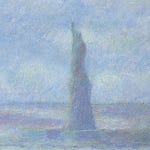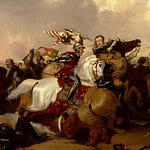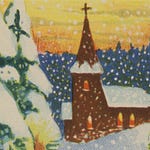Damir Marusic and WoC executive editor Santiago Ramos get together to discuss Damir’s latest article, “Why We Need Nightmares.” In it, Damir writes about the the binding of Isaac — the chilling story from the Book of Genesis where God asks Abraham to sacrifice his son. Damir is fascinated both by the story and by a Caravaggio painting depicting it. “That’s the stuff,” he writes. But what is this “stuff”?
While searching for an answer to this question, Damir and Santiago cover a lot of ground. They discuss the story of Abraham and Isaac, as well as the different ways that philosophers have interpreted it. They talk about Kierkegaard, Nietzsche, and Kant. They come to the conclusion that, while we all have different words for it — terrifying, mysterious, sublime — everyone must grapple with the stuff. Grappling with the stuff is an essential part of living a human life, for believers and unbelievers alike.
This episode covers the Bible, philosophy, art, music, and much more. It is not a debate, but an exploration of what exactly it is that makes certain stories, works of art, and experiences so moving, compelling, terrifying. We enjoyed recording this episode so much that we decided to make it free for all subscribers.
Required Reading and Listening:
Damir, “Why We Need Nightmares” (WoC).
Damir, “The Pursuit of Passion for Its Own Sake” (WoC).
Damir, “It’s Not Really About Cancel Culture,” about Tár (WoC).
“Ending Summer on Violence and Despair, with Twitter’s Audrey Horne” (WoC).
The story of the binding of Isaac in Genesis 22 (King James Version).
Immanuel Kant (Stanford Encyclopedia of Philosophy).
Søren Kierkegaard (Stanford Encyclopedia of Philosophy).
Friedrich Nietzsche (Stanford Encyclopedia of Philosophy).
“Time of tension between dying and birth” quote by T. S. Eliot, in “Ash Wednesday” (Best Poems).
Mozart, Symphony No. 40 (Leonard Bernstein and the Boston Symphony Orchestra, YouTube).
Roger Scruton on pop music as addictive (YouTube).
Keith Richards on heavy metal, “No lift, no bounce, no syncopation” (YouTube).
Caspar David Friedrich, “Sea of Ice” (painting of shipwreck/example of the sublime).
The Rolling Stones, “Gimme Shelter” (YouTube).
Nirvana, “Radio Friendly Unit Shifter” (YouTube).
Shellac, At Action Park (YouTube).
Arvo Pärt, Cantus in memoriam Benjamin Britten (Norwegian Chamber Orchestra, YouTube).
Leonard Bernstein, “The Unanswered Question,” lectures (YouTube).
This post is part of our collaboration with the University of Pittsburgh’s Center for Governance and Markets.
Wisdom of Crowds is a platform challenging premises and understanding first principles on politics and culture. Join us!















